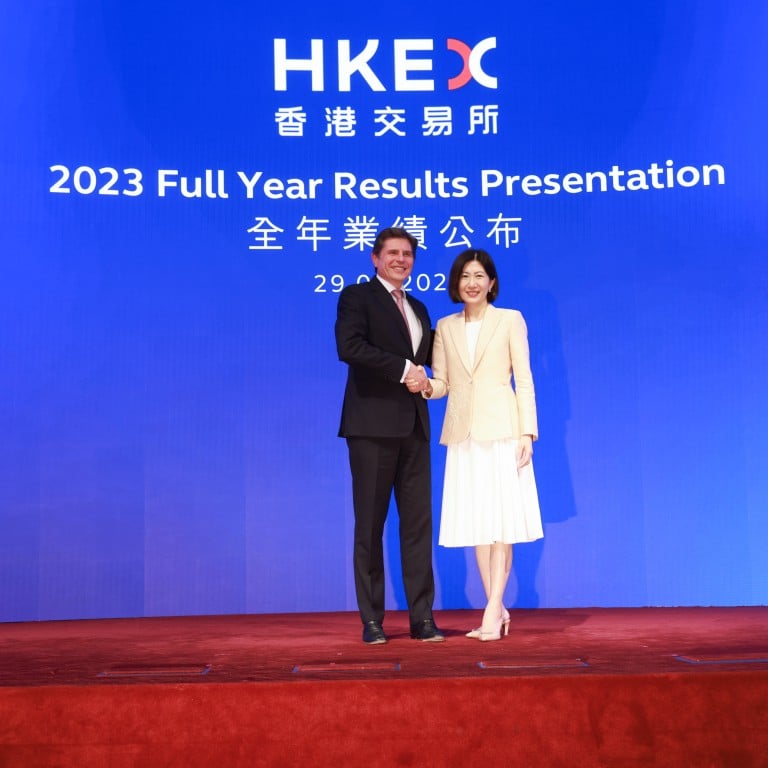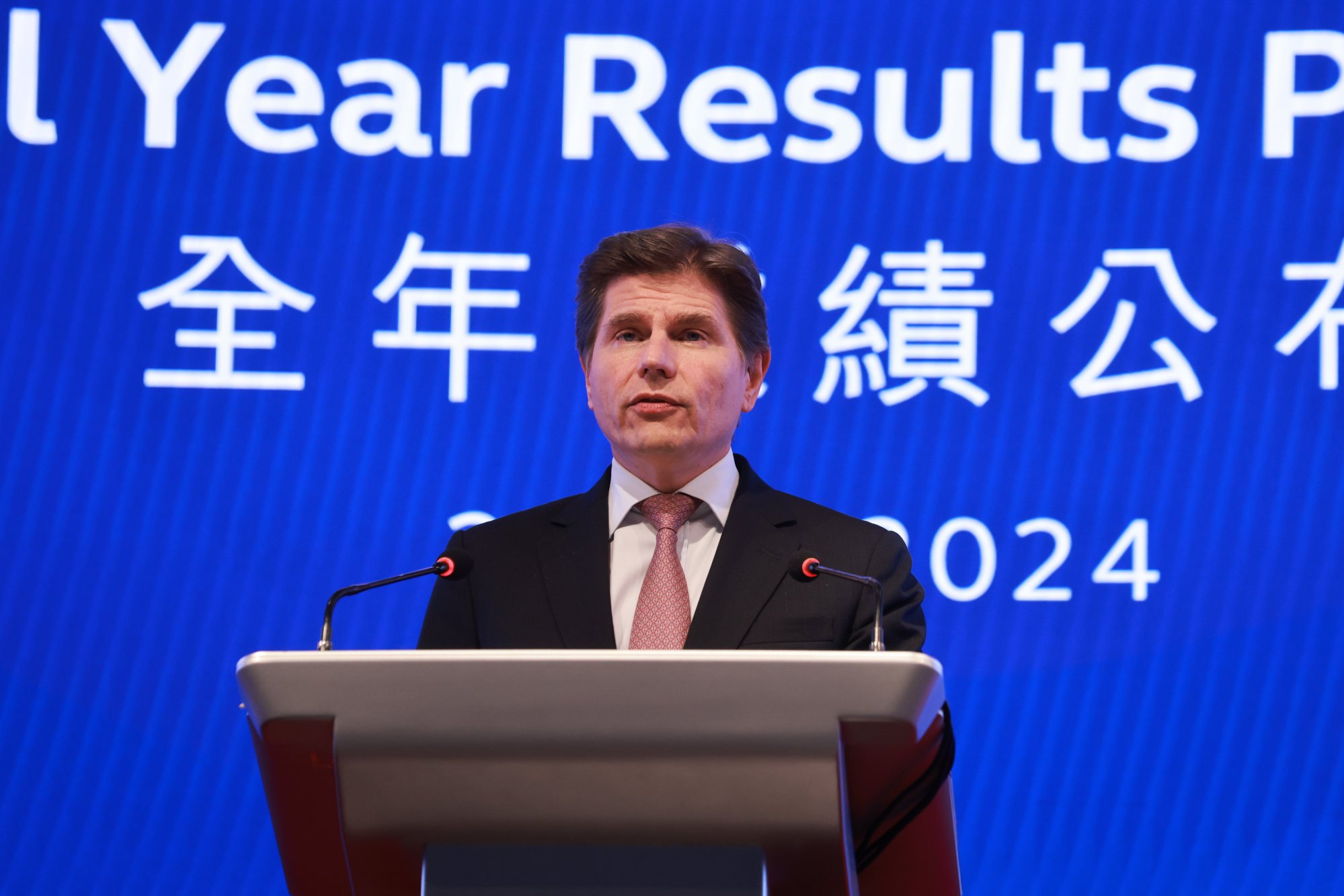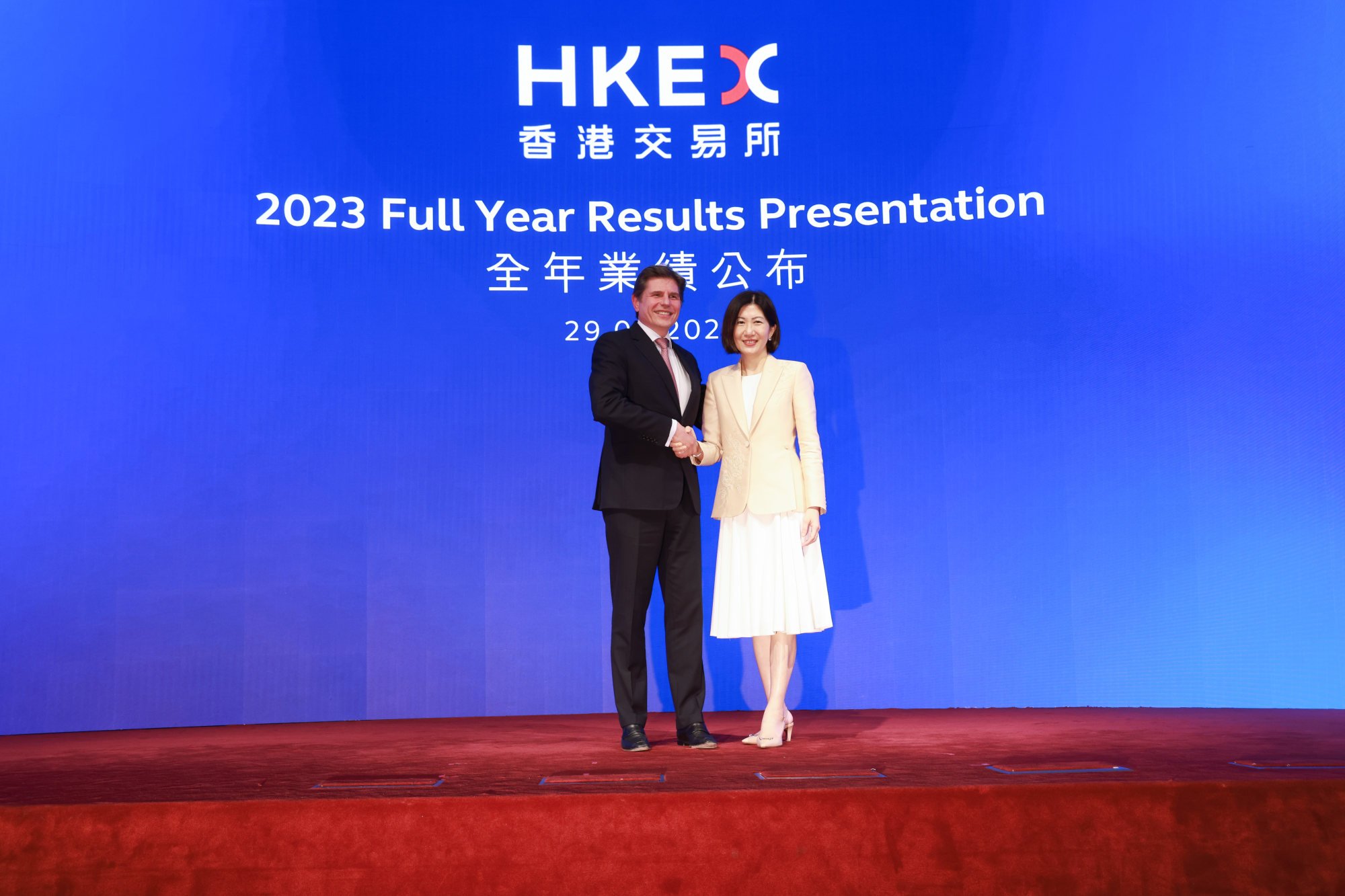
HKEX’s 2023 profit jumps 18%, as Aguzin passes the baton of running Hong Kong’s stock exchange to Bonnie Chan on a high note
- HKEX reports an 18 per cent increase in annual earnings to HK$11.9 billion (US$1.52 billion), matching market consensus
- Outgoing CEO Nicolas Aguzin says he has no regrets and believes his successor Bonnie Chan has got what it takes to be a successful leader
Hong Kong Exchanges and Clearing (HKEX), which operates Asia’s third-largest stock exchange, said earnings jumped last year by the most since 2020 on the back of a surge in investment income and derivatives trading as CEO Nicolas Aguzin ends his tenure after a tumultuous three years.
“I don’t regret anything because I feel that I have tried to do my best in everything that I tried to do,” Aguzin said at his last media briefing on Thursday. “I feel very grateful for the opportunity, the learnings and experiences. I will cherish this for the rest of my life.”
During Aguzin’s three-year tenure, he had to deal with the Covid-19 pandemic, the US-China trade war and rising interest rate cycle, which proved to be a drag on market turnover. Still, on his last day, the HKEX reported it second-best ever annual profit.
Net profit increased 18 per cent to HK$11.9 billion (US$1.52 billion), or HK$9.37 per share, according to its stock exchange filing on Thursday, the biggest increase since a 22 per cent jump in 2020. Analysts tracked by Bloomberg had forecast the firm to generate HK$11.9 billion for 2023. It was also the highest earnings since it earned HK$12.5 billion in 2021.

It proposed to pay HK$3.91 per share in second interim dividend, bringing the total to HK$8.41 for the year, versus HK$7.14 in 2022, and maintaining the payout at 90 per cent of earnings.
Earnings in the final three months of 2023 declined 13 per cent to HK$2.6 billion from HK$2.98 billion in the same quarter last year as average transactions of equity products shrank amid a market sell-off.
“We diversified our business in such a way that we were able to achieve the second-best financial results in history despite the challenging global backdrop and softer cash market,” Aguzin said.

HKEX booked almost HK$1.5 billion net investment gain in its portfolio of global stock and bond holdings last year, compared with a loss of HK$48 million a year earlier. Its annual results were also aided by higher fees from handling a higher volume of derivative transactions.
Futures contracts rose 4 per cent to 742,000 per day on average last year, while stock options contracts also climbed by 4 per cent to 612,000 per day, the report showed. The stock exchange also handled 40 billion yuan (US$5.6 billion) of transactions in yuan-denominated bonds by offshore investors through the Bond Connect scheme, a 24 per cent increase from a year earlier.
Aguzin joined HKEX in May 2021 from JPMorgan Chase’s private banking unit, taking over the helm soon after the Covid-19 pandemic outbreak ravaged businesses and sent the city’s economy into a recession. China’s faltering post-Covid recovery also fanned an exodus of foreign investors, shrinking trading volume.
HKEX’s shares slumped 46.5 per cent on his watch through Wednesday, erasing HK$270 billion from its market value. The benchmark Hang Seng Index slipped 42 per cent over the same period. The stock fell after the earning a report, losing 0.8 per cent to HK$242.8 on Thursday close.
Aguzin decided in December against extending his contract and earlier this month opted to exit sooner than scheduled, citing a smooth transition in place.
Rate cuts, China recovery to boost Hong Kong stocks in dragon year: Paul Chan
Bonnie Chan Yiting, the co-chief operating officer, will take over the top post from Friday, while Wilfred Yiu Ka-yan, the current co-chief operating officer, will become her deputy.
The duo stood for a photo at the result briefings to show the transition.
“I have seen Bonnie work over the last three years. She has all the ingredients to be an incredibly successful CEO,” Aguzin said. “My advice to her is to continue being herself.”
Aguzin said he would continue to stay in Hong Kong, but travel to the US to see his children, while he pauses to consider his next step.
HKEX introduced many trading products including futures on MSCI A Shares Index and exchange-traded funds under Aguzin’s watch. The attempts at diversification helped mitigate a broad slump in Chinese stocks, given that mainland companies account for about 50 per cent of the listings and 80 per cent of the market capitalisation.
Daily turnover in stocks tumbled 16 per cent HK$105 billion in 2023, clipping HKEX’s trading fee income by 18 per cent, the company said in the filing. Proceeds arising from stock offerings more than halved to a 20-year low of US$5.9 billion based on Reffinitiv data, as HKEX’s listing fees from the business fell by 8 per cent.
Financial Secretary Paul Chan Mo-po in his Budget speech on Wednesday said the stock exchange and securities market regulators will roll out new measures to boost market activity. China’s state-run funds have also intervened to stem a loss of confidence, while the market regulators curbed disruptive trading by hedge funds.
“In recent times, a series of measures introduced by the mainland have actively stimulated the capital market, which is expected to have a positive impact on the Hong Kong stock market as well,” said Kenny Ng Lai-yin, a strategist at Everbright Securities International.
Besides, Beijing has sharpened its focus on financial integration in the Greater Bay Area by expanding the scope of the Wealth Management Connect scheme. Hong Kong also resumed an investment migration scheme to attract fresh investment in the city’s capital market.

